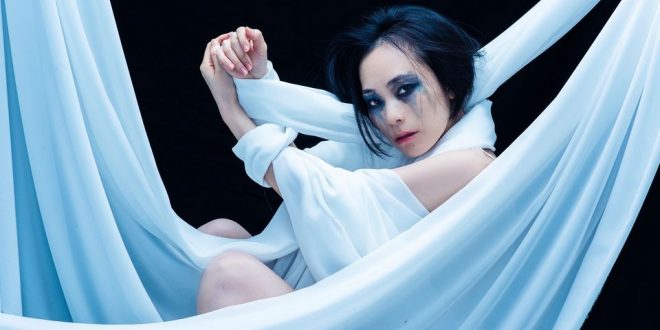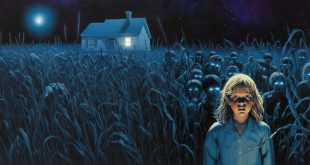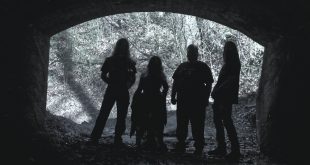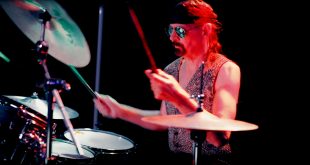Shihori Nanake, best known by her mononym Shihori, is a renowned Japanese pop singer and pianist, originally from Nagoya and based in New York City. As a child, Nanake struggled with deafness in one ear and Asperger’s syndrome, two disabilities she would learn to transcend once she started singing in public. From there, she began actively writing original music, with thematic angles of love and self-acceptance bolstering her message. Realizing her first top-5 chart success with the single “Never End Wonderland,” Nanake eventually went on to earn 11 gold disc certifications and accumulate multiple number one hits on the Oricon Singles Chart. In May of 2020, two years after moving to America, she sang lead as part of a modern, collaborative rendition of the Cowboy Bebop classic “The Real Folk Blues,” which rose to number 6 on Billboard’s World Digital Song Sales Chart and raised over 50 thousand dollars for Covid-19 relief. In addition to her singing endeavors, Nanake holds hundreds of credits as a lyricist and composer, including contributions to other world-famous anime such as Fairy Tail, The Irregular at Magic High School, and Macross Frontier.
Today, Shihori releases her new single, “Invisible,” which centers on the fleeting feelings a person experiences amidst a complicated relationship. I caught up with her the day before her virtual concert at Michiko Rehearsal Studios to discuss her formative struggles within her career progression, realizing a path to success, the background behind “Invisible,” as well as what she has learned while starting on a clean slate in the United States.
When you were growing up, you were inspired by classical music as well as Japanese pop. Can you tell me more about being exposed to both genres at the time?
Yes, I loved both of those because they featured very skillful musicians, which influenced me a lot. I was also into a lot of anime back then, and basically, my style became anime music mixed with piano pieces – like Beethoven – and very emotional melodies. The intensity expressed in those types of music inspired me because of the oppression I faced at the time, being bullied because of my disabilities. It kind of felt like everyone was my enemy, and I didn’t have any way to run away, because my family was very strict about education, so listening to that music was very emotional for me.
I see, and by 17, that’s when you really became aware of your purpose as a singer, and as a musician. At what point did you start getting noticed on a professional level?
I think that started when I moved to Tokyo. As a teenager, I didn’t have many opportunities in my hometown. But once I moved, the gigs I got involved recording for TV commercials and having my music in video games like Beat Mania. After that, I made my major debut as a kind of anime singer/songwriter. Then, more people started noticing my high-energy performances and recognized the power in my melodies and message.
Right, and I notice you’ve also done a lot as a composer – huge things like The Irregular at Magic High School and Macross Frontier. How did you feel when you received these opportunities, especially being able to contribute to things that are so well-known?
By that time, I felt like making my career more complete, not just as a singer and an artist, but as someone who provides songs for others. I participated in song competitions, and at first, no one picked my songs (laughs), but the first person who took interest in them was actually Yoko Kanno. That was for Macross Frontier, and I loved that music. As I got more confident in my writing, my songs started to get picked by more popular composers. It was so exciting, and it felt great because it’s a big contribution to the industry.
It’s interesting how you mention that, at first, your songs weren’t considered. Did you still face challenges at that time?
Yes. Even though I started getting more opportunities from my major debut, it was still difficult. My songs were very mature given my age at the time [26], and the people at the record label said I needed to tone them down, make them more pop, and easier to listen to.
That’s so they’re more accessible, right?
Yeah, yeah. But it didn’t match my uniqueness, so it seemed difficult to really make it.
Yeah. I notice you were a very adventurous songwriter back then, and you still are to this day. Those songs have allowed you to collaborate with, like you’d mentioned, Yoko Kanno, who was the first person in the industry to really recognize your talent. How did you eventually get to work with her?
Ahh! Well, how I got to work with her was by saying things aloud, like, “I wanna work with Yoko Kanno!” Then, once someone in management heard that I was talking a lot about working with her, he got me an appointment with her producer! I was like, “Oh my God! This is what I’ve been dreaming of,” and I told him all about how her music really affected me when I was in high school. Then, he got me into the lyric competition for one of the Macross Frontier movies. I worked really hard with everybody, and I won the competition! I was like, “Yay! Thank you so much!” Right away, Yoko Kanno had a lot of hard requests, like, “Can you do ‘this’? How about ‘this’?” But we worked together, and we did it!
That’s awesome. You were a team!
Yeah, what we did was super high quality!
I agree, and you have a lot to show for your success – 11 gold singles, which equates to millions of sales, and loads of songwriter credits on top of that. Throughout that time, you were also briefly known as Sena, from the beginning of your major debut in 2007 until 2011. What went on during the shifting between artist names?
Actually, that’s part of a complex story. Before my major debut, I was really depressed, because those people in the industry expected so much from me – “Oh, you should do ‘this’; you should do ‘this’.” So many different things from so many different people. I was so confused! The management company I was with at the time was very bad – very Yakuza-like. One of those people had yelled at me, “Someone from the record label is at this gig, and if you don’t do well, I’m gonna kill you!”
Jeez!
Yeah! I was so scared! That was in 2003, and by the end of 2005, some of the members of that company kidnapped me. I was almost dying.
Oh, that sucks! I can imagine.
Yeah, I couldn’t work, and so I had no money to eat, and I got really skinny. It was so traumatizing, you know? I had lost all my confidence.
With Sena, that must have felt like a moment of rebirth.
Yeah. By that time, I wanted a different name; I refused to be known as Shihori since it was associated with too much trauma. But Yoko Kanno was the one who encouraged me to return to using Shihori, so I was Shihori again, and I actually became more popular in the industry under that name.
So, it was Shihori, then Sena, then back to Shihori, is that right?
Yeah, yeah, sorry, it’s very complicated (laughs)! But yeah, it was meant as a way of starting over.
I understand, and I appreciate you telling me this. Going forward to your recent happenings, you’re having your first virtual concert. You’ll be pleased to know that I bought a ticket, so I’m going to see you tomorrow!
Oh, thank you so much!!! I’m so happy!!!
Is this your first virtual show?
Yes! Ever since the pandemic happened, we haven’t had many shows – or any shows at all (laughs).
Another thing about this show is that you’ve reacquainted with your bandmates for the first time in a long time. How does it feel to play in the same room?
Actually, we just had our first rehearsal together a few days ago. I felt so happy to play together with them. It took me a long time to get back into performing with other people, you know? But I felt a real sense of happiness rehearsing with them again. It was so amazing!
Now, you also have a new single called “Invisible.” How did that song come about?
I actually came up with the idea for the song over a year ago – the part that goes “(hums chorus melody),” you know? I got the chorus part, but didn’t work on the song for a long time because of the language problem. I can write melodies immediately, but have trouble writing lyrics in English, so it needed a long time to get all of the lyrics out of me, and I finally finished them last year – probably in November. It’s been like that ever since I came to America. I’d come up with a piece of a melody, and then it takes so long to come up with the verses.
That’s always the most difficult part. The chorus comes quickly, and then you’re like, “How do I center these verses around the chorus?” But you ended up making a great song out of it.
Thank you (laughs)!
You mentioned coming to America, and I know that you moved to New York back in 2018. In your experience, how does America’s music listening environment differ from Japan?
It’s so different. The biggest thing is that CD sales are still relevant in Japan, especially when it comes to your fans, but over here, almost nobody buys CDs. Instead, Americans say, “Are you on Spotify,” or “Hey, check this video out on YouTube,” whereas Japanese people like CDs and aren’t on Spotify very much. It seems to be a lot harder over here. It’s a big transition, and plus, I don’t have any fans here, so it’s all about starting from zero; that’s what’s the most difficult.
I understand. As an American fan who has just been introduced to your music through this interview with you, you’ve definitely grown a lot both as a singer/songwriter, and in the way you express yourself instrumentally. When it came to the production of your newer songs, did you do it yourself, or do you collaborate with other people?
Well, the first year I was here, I released an EP, but I didn’t have any connections yet, so I had to do it by myself, which I had been doing already in Japan, too. I tried to Americanize myself, but in my style and with my perspective. I made more band-style music, and at first, I thought, “Wow, this sounds very Americanized,” but then it became more unique – like more Shihori-style (laughs)! Then, I started to learn more about how American musicians produce their music by going to studios and collaborating more. It was difficult at the time, and the process was different than how I’d do it in Japan, but the more people I worked with, the more used to it I got. I think I’ve gotten a lot better since last year.
That’s awesome! Considering your journey so far, what’s something you’ve learned about America that you’ve applied yourself?
I’ve learned that there are so many differences between Japanese culture and American culture, in particular, language. Our grammar is totally opposite, and because of that, I notice that Americans are straight to the point, which makes their communication effective and practical. In Japan, people tend to give long explanations. At first, I didn’t know that was happening. But once I recognized how that affects the way they communicate, as well as make music, I had to put aside my experience as a professional, since Americans have a different perspective than I do. Over time, I began to understand, and was able to change the way I structure everything in my mind.
Your purpose as a singer is to make the world better. Do you feel you’ve been working toward achieving that goal?
Yes. I’ve always wanted to be known as a singer, rather than primarily as a songwriter. When I began my career, I was evaluated more as a composer. It was nice because I could spread my message to people through other artists, but I wanted to sing on my own. Culturally, it was harder for me to do that because Japan is used to having cuter, more submissive performers, and I’m not submissive. Everything about me was considered ‘too strong,’ and if I were to tone that down, then that’s bullshit (laughs)! But in America, women are valued for being strong, opinionated, and sexy. I mean, Japan has a beautiful culture, too, but I wanted to try my approach in America. I wanted to master writing and singing songs in English, with my own voice, even though I don’t have a solid fanbase here. I’m not exactly sure how I’m doing, but still, I’m so ambitious to do that and achieve that dream.
Lastly, anything you’d like to say to your fans?
Yes! Dear fans, I hope to reach your hearts through my music. Both my music and my message come from my spirit, and I want to see an amazing and better world together with you!
Shihori Socials:
 Music Existence Because of Music, We Exist
Music Existence Because of Music, We Exist




